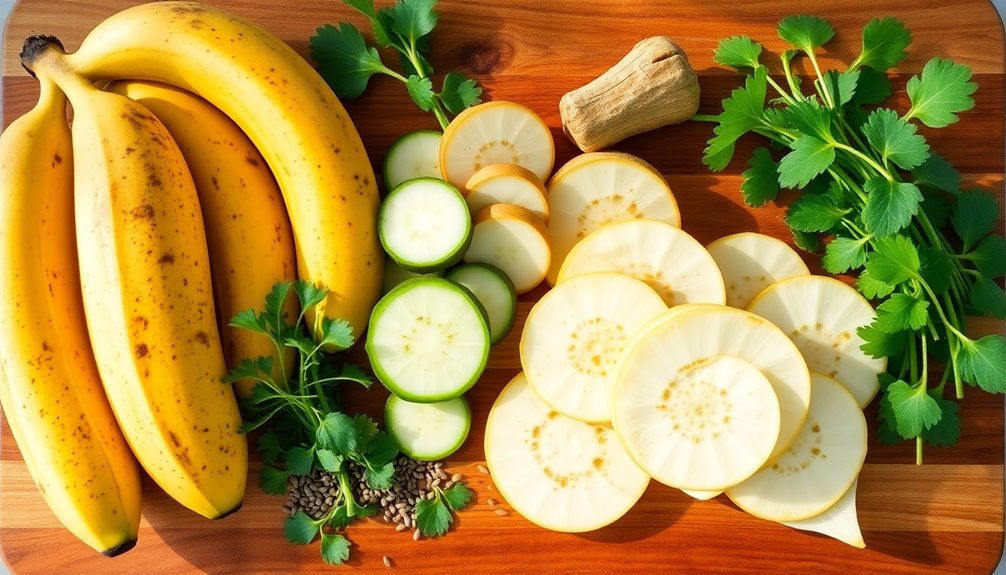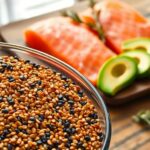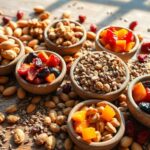To include prebiotic-rich foods in your diet, start by adding ingredients like garlic, onions, and bananas to your meals. You can make whole grain pasta with sautéed garlic or enjoy banana overnight oats for breakfast. Snack on raw veggies or whole-grain crackers with avocado for a boost. Try rotating these foods weekly to keep things interesting and flavorful. Don't forget to monitor how your body responds, adjusting as necessary. With a little creativity in the kitchen, you can enhance your gut health greatly—keep exploring for more tips and tricks to maximize your prebiotic intake.
Key Takeaways
- Start with small portions of prebiotic-rich foods like garlic, onions, and bananas, gradually increasing intake as your body adjusts.
- Incorporate chickpeas and whole grain pasta into your meals for a delicious way to add prebiotics.
- Experiment with snacks like raw vegetables, whole-grain crackers with avocado, or yogurt parfaits for convenient prebiotic options.
- Rotate prebiotic foods weekly to maintain variety and keep meals interesting while supporting gut health.
- Monitor your body's response to prebiotics by keeping a food diary and adjusting your diet accordingly.
Understanding Prebiotics
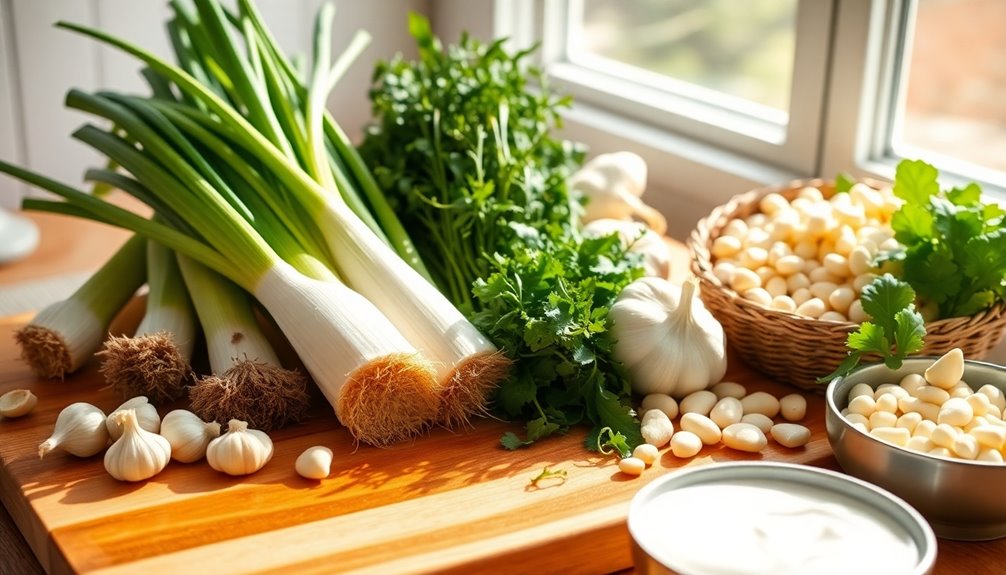
Prebiotics are key elements that play a noteworthy role in gut health, and you might be surprised to learn just how advantageous they can be. They're non-digestible fibers found in certain foods that serve as nourishment for the beneficial bacteria in your gut. By feeding these good bacteria, prebiotics help maintain a balanced microbiome, which is essential for digestive health.
When you consume prebiotics, they ferment in your large intestine, encouraging the growth of healthy gut bacteria. This process not only aids digestion but also supports your immune system, enhances nutrient absorption, and can even improve your mood. Research shows that a healthy gut microbiome can contribute to better overall health, reducing the risk of conditions like obesity, diabetes, and gastrointestinal disorders.
You might wonder how to incorporate more prebiotics into your daily routine. Start by including foods rich in these fibers, such as garlic, onions, asparagus, and bananas. They're simple to add to your meals and can elevate the flavors while providing those key benefits. Furthermore, incorporating a plant-based diet can significantly enhance your intake of prebiotic-rich foods that contribute to your overall gut health.
Understanding prebiotics is essential in your journey toward better gut health. By prioritizing these components in your diet, you're not just feeding your body; you're also nurturing the beneficial bacteria that support your digestive health.
Key Prebiotic Foods
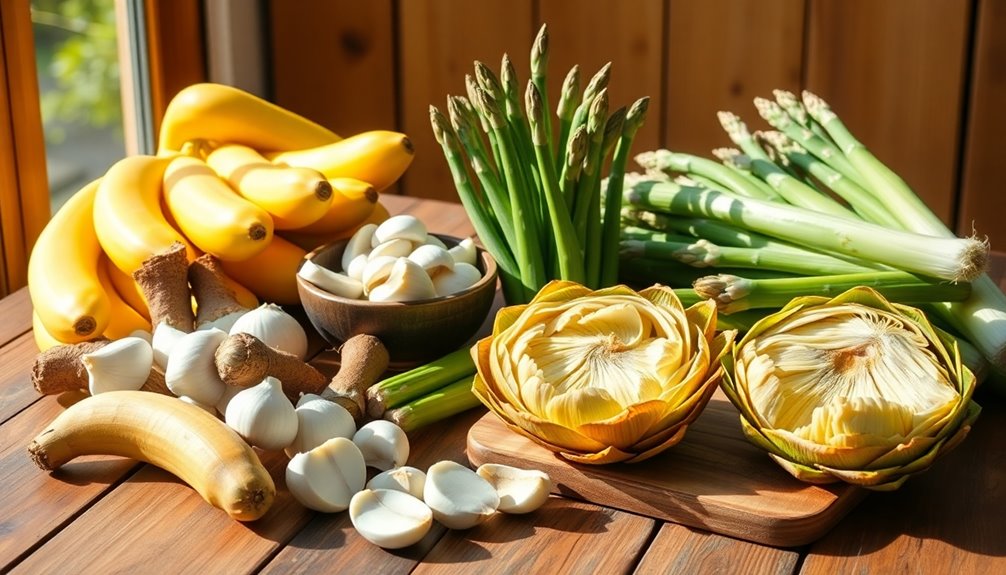
Incorporating just a few key prebiotic foods into your diet can greatly enhance your gut health. Prebiotics serve as nourishment for the beneficial bacteria in your gut, helping to maintain a balanced microbiome. Here are three top prebiotic sources you should consider adding to your meals:
- Garlic: This flavorful staple isn't just great for cooking; it's rich in inulin, a type of prebiotic fiber that promotes the growth of good bacteria.
- Onions: Whether you enjoy them raw, sautéed, or caramelized, onions are another fantastic source of inulin and fructooligosaccharides. They're versatile and can be easily included in countless dishes.
- Bananas: A convenient snack, bananas contain resistant starch, especially when they're slightly green. They not only provide energy but also support your gut health by acting as a prebiotic.
Integrating these foods into your diet can be both simple and delicious. You can sprinkle garlic on your roasted vegetables, toss onions into your salads, or grab a banana for a quick breakfast. By making these small adjustments, you'll be fostering a healthier gut environment. Additionally, improving your gut health through prebiotics may help in managing underlying conditions that contribute to chronic kidney disease.
Benefits of Prebiotics
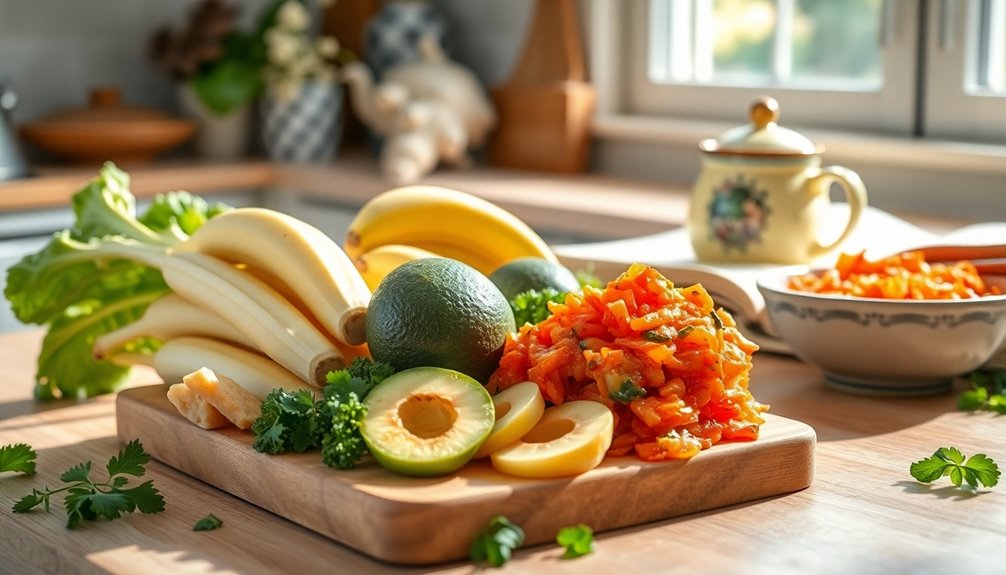
A healthy gut can greatly influence your overall well-being, and that's where prebiotics come into play. These non-digestible fibers serve as food for the beneficial bacteria in your gut, supporting a thriving microbiome. When you include prebiotic-rich foods in your diet, you're not just feeding your gut; you're enhancing your digestive system's functionality.
Research shows that prebiotics can improve gut health by promoting the growth of good bacteria, which can lead to better digestion and nutrient absorption. This balance is pivotal because a diverse microbiome is linked to a stronger immune system, helping you fend off illness more effectively. Additionally, prebiotics may help reduce symptoms of digestive disorders, such as bloating and constipation, making your life more comfortable.
Moreover, prebiotics can influence mental well-being. There's a growing body of evidence suggesting that gut health plays a significant role in mood regulation. By fostering a healthy gut environment, you could potentially enhance your mood and overall mental clarity.
Incorporating prebiotics into your meals can also lead to increased feelings of fullness, aiding in weight management. When you feel satisfied after eating, you're less likely to snack mindlessly throughout the day. Following a natural cycle of consumption, similar to our ancestors, can also help promote a lean and healthy body through the inclusion of natural calorie cycles.
In short, the benefits of prebiotics extend beyond just gut health. By nurturing your digestive system with these essential fibers, you're making a proactive choice for your overall well-being. So why not start making small changes today to reap these rewards?
Easy Meal Ideas
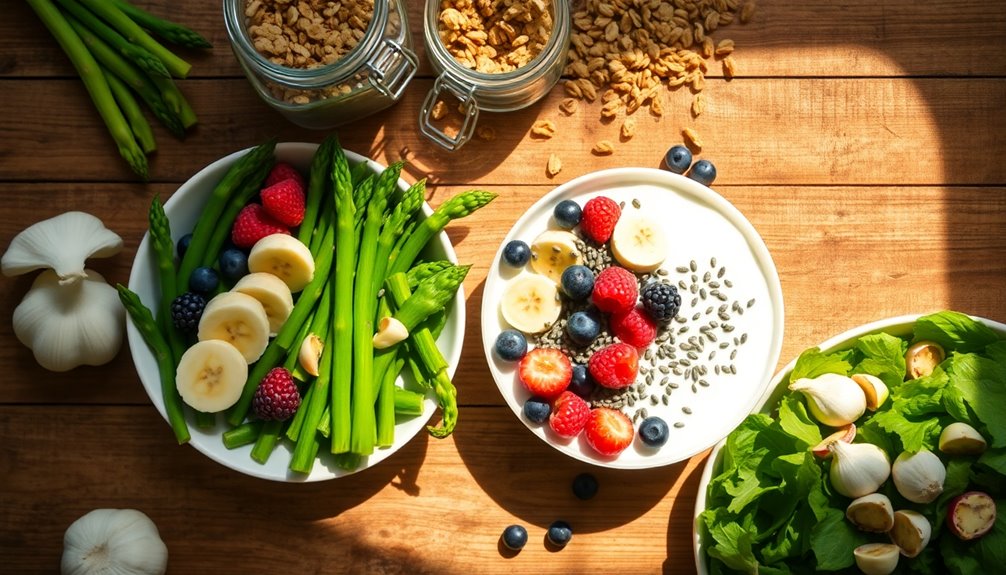
When it comes to adding prebiotic-rich foods to your diet, meal planning can be both simple and enjoyable. By incorporating these foods into your meals, you can support your gut health while enjoying delicious dishes. Here are some easy meal ideas that offer recipe inspiration and quick options for busy days:
- Chickpea Salad: Toss together canned chickpeas, chopped tomatoes, cucumbers, red onion, and a dressing of olive oil, lemon juice, salt, and pepper. Chickpeas aren't only a great source of protein but also packed with prebiotics.
- Whole Grain Pasta with Garlic and Onions: Cook whole grain pasta and sauté garlic and onions in olive oil. Add a splash of vegetable broth and toss in your favorite veggies. The onions provide a significant prebiotic boost while making the dish flavorful.
- Banana Overnight Oats: Mix rolled oats, almond milk, sliced banana, and a sprinkle of chia seeds in a jar. Let it sit overnight in the fridge. Bananas are a fantastic prebiotic source, and this meal can be ready within minutes, perfect for those hectic mornings.
Incorporating these meals into your routine can also help you stay on track with your custom keto diet plan, allowing you to balance your nutritional needs while enjoying a variety of foods. These meal ideas not only cater to your health goals but also fit seamlessly into your lifestyle. By choosing prebiotic-rich ingredients, you're making a conscious decision to nurture your body and foster a sense of community around nourishing food. So, grab your ingredients and get cooking!
Snacks With Prebiotics
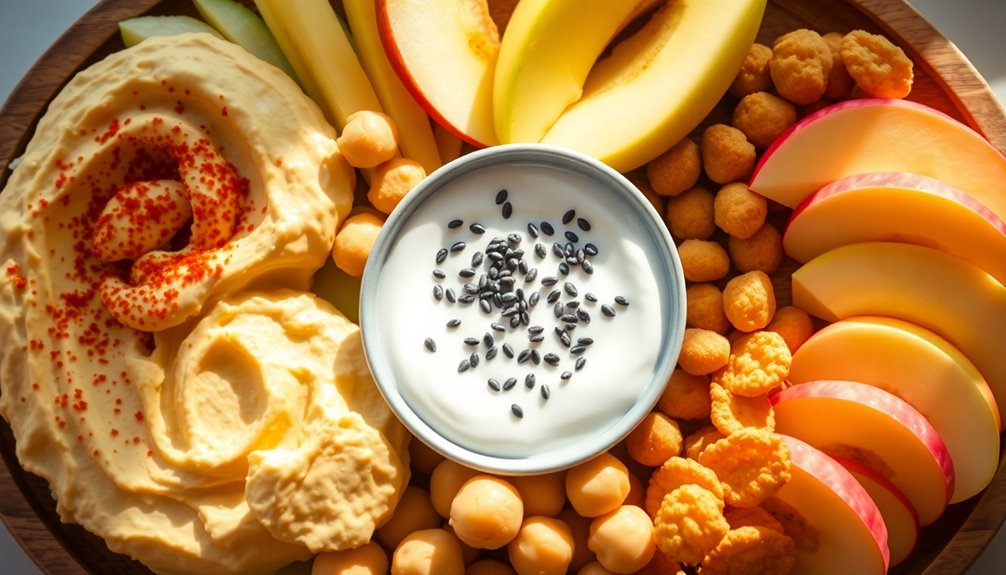
Snacking doesn't have to be a guilty pleasure; it can actually support your gut health with the right choices. By incorporating prebiotic-rich snacks into your routine, you'll not only satisfy your cravings but also nourish your digestive system. Prebiotics are the non-digestible fibers that feed your beneficial gut bacteria, promoting a balanced microbiome.
Start with simple prebiotic snack ideas like raw vegetables such as asparagus, leeks, and garlic. Pair them with hummus for a delightful crunch that's both satisfying and gut-friendly.
You can also opt for whole-grain crackers topped with avocado or a spread made from beans, which are rich in prebiotics.
For something sweet, consider indulging in prebiotic-rich desserts. A parfait made with yogurt, bananas, and a sprinkle of chia seeds can be a delicious way to get your prebiotic fix.
Another option is to whip up a quick banana bread using whole wheat flour and oats, which not only tastes great but also boosts your fiber intake. However, it's important to note that traditional wheat products can have negative health impacts on gut health and may contribute to chronic inflammation.
Incorporating Prebiotics Gradually
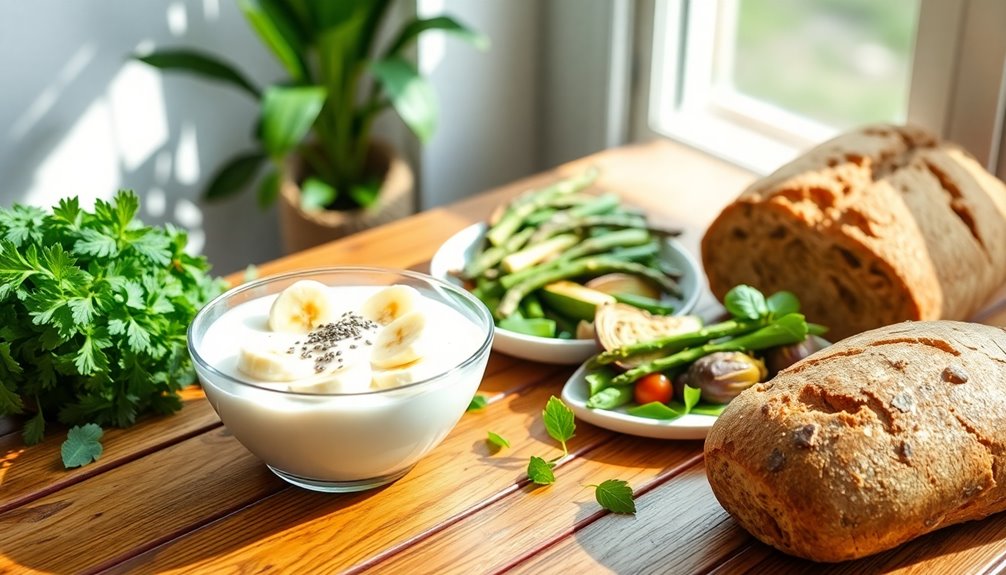
Here is the revised content with an additional sentence:
Gradually incorporating prebiotics into your diet can enhance your gut health without overwhelming your digestive system. A slow integration is key to allowing your body to adjust and reap the benefits without discomfort. A gentle introduction helps you avoid digestive issues like gas and bloating often associated with sudden changes in your diet.
Here are three effective ways to start:
- Start Small: Begin with small servings of prebiotic-rich foods, like a tablespoon of chia seeds or a few slices of raw onion. This way, your gut bacteria can adapt gradually.
- Rotate Foods: Instead of adding multiple new prebiotic foods at once, try rotating different options each week. For instance, one week focus on garlic, and the next on asparagus. This approach keeps your meals interesting while helping your gut adjust.
- Mix and Match: Incorporate prebiotic foods into dishes you already enjoy. Add a handful of oats to your morning smoothie or toss some leeks into your favorite stir-fry. This strategy makes it easier to embrace new flavors without feeling overwhelmed.
Taking these steps not only supports your digestive health but also fosters a sense of belonging in your food choices. You're part of a community that values wellness and nutrition. Remember, slow integration is essential—your gut will thank you for it! Including plant-based protein in your smoothies can further enhance your gut health and overall nutrition.
Cooking Tips for Prebiotics
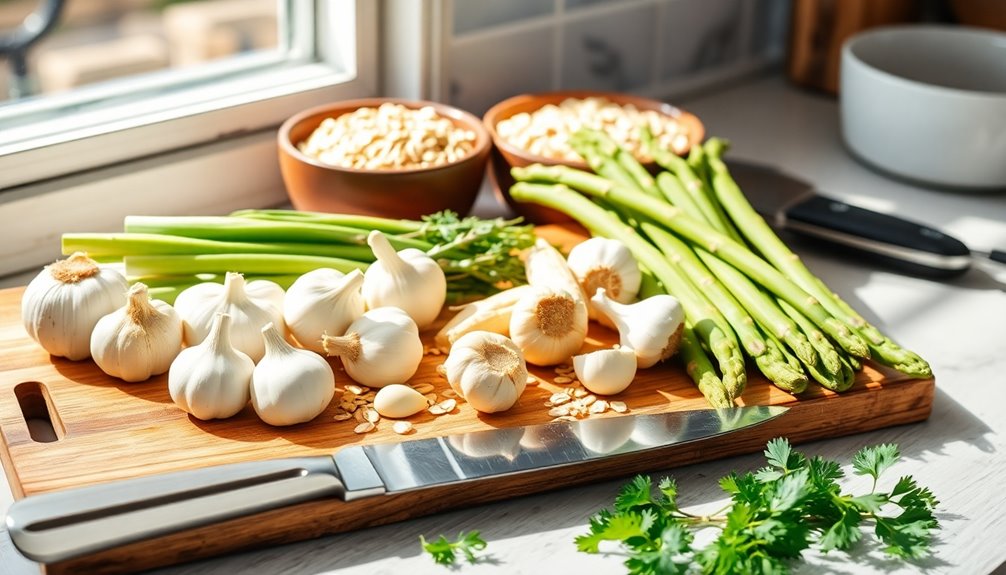
Cooking with prebiotic-rich foods can be a delightful and health-enhancing experience. To make the most of these nutrient-packed ingredients, it's crucial to explore practical cooking tips that can elevate your meals while promoting gut health.
Start by exploring a variety of prebiotic foods. Consider garlic, onions, leeks, asparagus, and bananas. These ingredients can easily be integrated into your favorite recipes, offering both taste and health benefits.
For instance, experiment with adding sautéed garlic and onions to your pasta dishes or incorporating bananas into smoothies for a natural sweetness.
For recipe inspiration, think about preparing a hearty vegetable soup. Mix your preferred prebiotic vegetables, legumes, and whole grains. This dish won't only be comforting but also rich in fiber that nourishes your gut bacteria.
Another excellent technique is to roast vegetables; it intensifies their flavors while preserving nutrients.
Regarding your shopping tips, always seek out fresh, seasonal produce. Local farmers' markets are fantastic spots to discover top-quality prebiotic foods. Remember to inspect the labels on packaged goods, as some might contain additional sugars that could counteract the benefits of prebiotics.
Additionally, incorporating prebiotic-rich foods into your diet can support liver health, potentially reversing conditions like fatty liver.
Lastly, keep in mind that cooking is a shared experience. Share your prebiotic-rich creations with loved ones to cultivate a sense of community while encouraging healthy eating habits. By incorporating these suggestions, you'll not only fuel your body but also prepare delectable meals that everyone can savor.
Prebiotic Supplements Overview
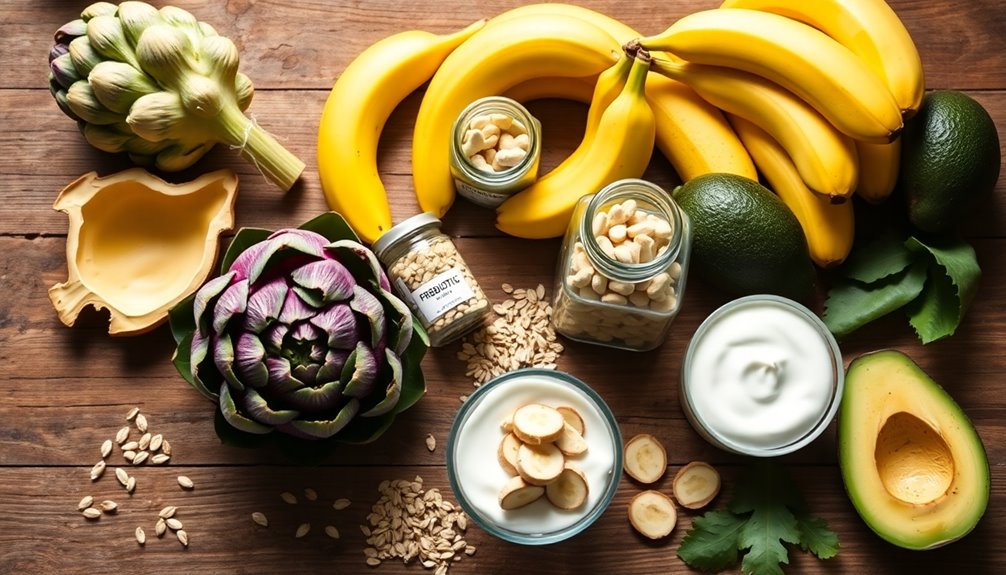
Understanding the role of prebiotic supplements can enhance your approach to gut health. These supplements can be a convenient way to make sure you're getting enough prebiotics, especially if your diet lacks sufficient prebiotic sources. By integrating these into your routine, you can support your digestive health and promote a thriving gut microbiome.
Here are three key points to keep in mind when exploring prebiotic supplements:
- Types of Prebiotics: Common prebiotics found in supplements include inulin, fructooligosaccharides (FOS), and galactooligosaccharides (GOS). These ingredients can help nourish beneficial gut bacteria, leading to improved digestion and overall health.
- Prebiotic Dosage: It's crucial to follow recommended dosages, usually found on the supplement label. A typical daily dose ranges from 5 to 10 grams, but it's best to start with a lower amount and gradually increase to avoid digestive discomfort.
- Combination with Foods: While supplements can be beneficial, they shouldn't substitute whole food sources. Incorporating foods high in prebiotics, like garlic, onions, and bananas, can complement your supplement intake. Additionally, research from the Garvan Institute of Medical Research has highlighted the importance of a balanced diet in maintaining overall metabolic health, which is crucial for individuals managing conditions such as diabetes.
Monitoring Your Gut Health
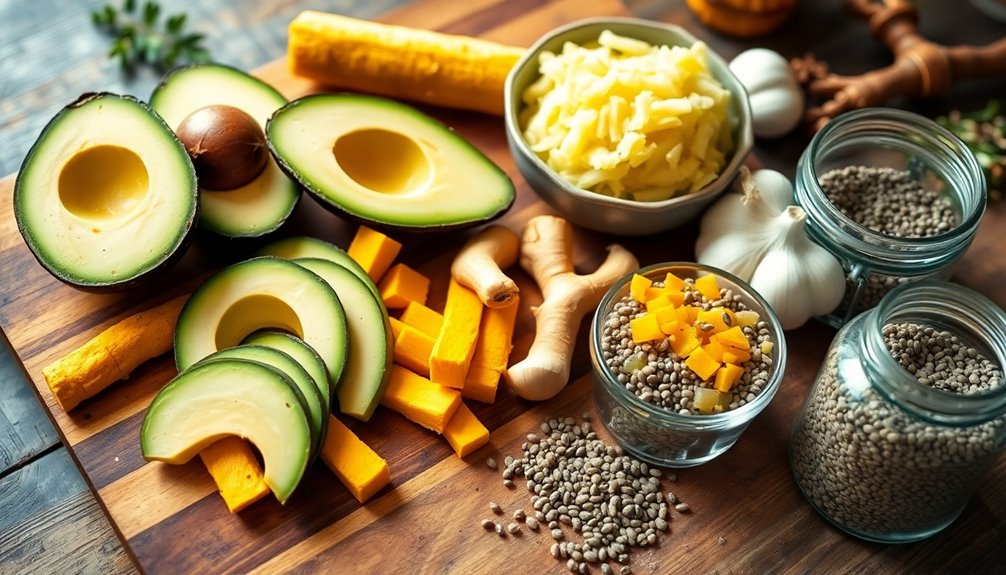
Monitoring your gut health is pivotal for maintaining overall well-being and can greatly impact your digestive system. Your gut bacteria play a vital role in this process, influencing everything from digestion to immune function. By regularly checking in on your gut health, you'll gain insights into your microbiome balance and how it affects your daily life.
Start by paying attention to how your body responds to different foods. Notice any changes in digestion, energy levels, or mood after consuming prebiotic-rich foods such as garlic, onions, and bananas. These foods feed your beneficial gut bacteria and can help improve your microbiome balance. Keeping a food diary can help you track patterns and identify any potential triggers that lead to discomfort.
Another effective way to monitor your gut health is through regular check-ups with your healthcare provider. Discuss any gastrointestinal symptoms you may experience, and consider requesting tests that analyze your gut microbiome. This information can offer a more detailed view of your gut health and guide your dietary choices. Additionally, adopting a plant-based diet can significantly improve your gut health by providing a variety of prebiotic-rich foods that nourish beneficial bacteria.
Lastly, don't underestimate the power of community. Engaging with others who are also interested in gut health can provide support and new ideas for incorporating prebiotic-rich foods into your diet. Sharing experiences and tips can foster a sense of belonging while motivating you to stay committed to your gut health journey. Remember, a balanced microbiome leads to a happier, healthier you!
Frequently Asked Questions
Can I Consume Prebiotics if I Have Food Allergies?
Yes, you can consume prebiotics even if you have food allergies, but you need to carefully factor in allergy considerations. It's crucial to pinpoint which prebiotic foods might trigger your allergies.
Look for substitution options like bananas, asparagus, or oats, which are usually well-tolerated.
Always consult your healthcare provider before making adjustments to your diet, ensuring you receive the benefits of prebiotics while prioritizing your health and safety.
Are There Any Side Effects of Consuming Too Many Prebiotics?
Consuming too many prebiotics can lead to side effects like bloating and discomfort in your digestive system. While prebiotics are great for gut health, moderation is key. Overloading on them may overwhelm your digestive system, causing gas and cramps. It's important to listen to your body and adjust your intake accordingly. By finding the right balance, you can enjoy the benefits of prebiotics without the unpleasant side effects.
How Do Prebiotics Differ From Probiotics?
Prebiotics vs probiotics, both play essential roles in gut health. Prebiotics are indigestible fibers that nourish your gut bacteria, while probiotics are live bacteria that contribute to your microbiome. The advantages of prebiotics include enhanced digestion and strengthened immunity.
In contrast, probiotics can aid in balancing gut flora and promoting overall health. When contemplating prebiotic supplements, concentrate on their efficacy and safety to make sure you're selecting the optimal options for your well-being.
Can Prebiotics Help With Weight Loss?
Yes, prebiotics can aid in weight loss by improving gut health and supporting digestive health. They promote the growth of beneficial gut bacteria, which can enhance metabolism and reduce appetite.
When you include prebiotics in your diet, you're not just nourishing your gut; you're also fostering a healthier relationship with food. This can lead to better decisions and a feeling of belonging to a community focused on wellness and balance.
Do Cooking Methods Affect the Prebiotic Content in Foods?
Yes, cooking methods can affect the prebiotic content in foods. Raw vs. cooked prebiotics often yields different results; some prebiotic fibers, like in onions and garlic, lose potency when heated.
To maximize benefits, consider incorporating the best prebiotic sources like asparagus, bananas, and chicory root in their raw form. This way, you'll guarantee you're getting the most from these foods while supporting gut health and overall well-being.
Conclusion
By including prebiotic-rich foods in your daily diet, you can greatly enhance your gut health. Studies show that these foods not only promote beneficial gut bacteria but also support digestion and overall well-being. Remember to introduce prebiotics gradually to avoid digestive discomfort, and monitor how your body reacts. Combining prebiotics with a balanced diet can lead to long-lasting health benefits. So, start small, stay consistent, and enjoy the positive changes in your gut health!

